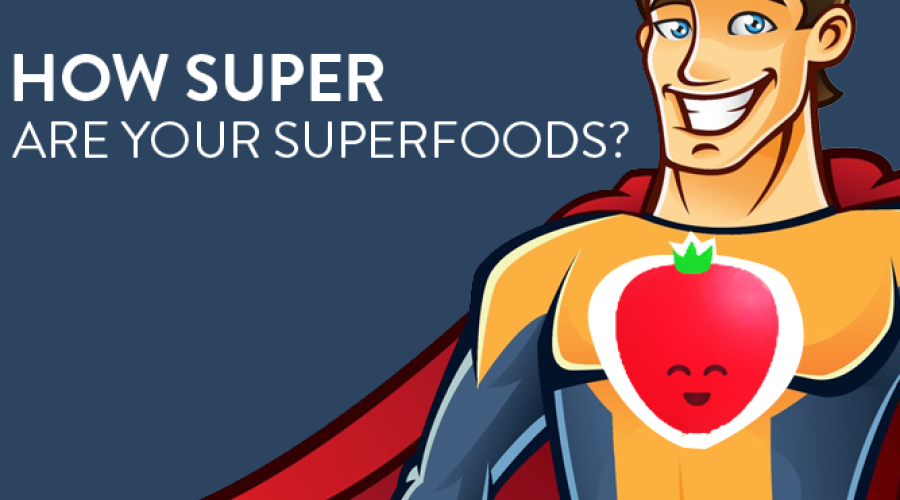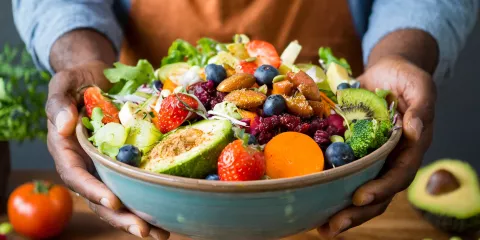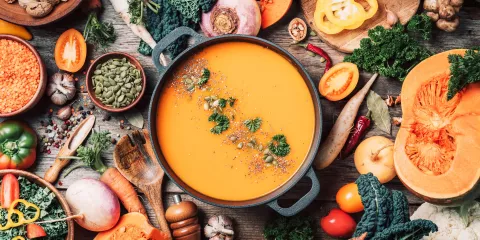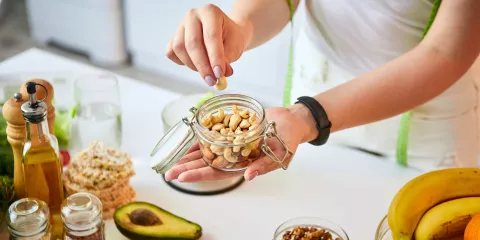
Every year the media touts a new list of the year’s most popular superfoods. TV personalities and social media influencers fill your newsfeeds with the latest superfood containing smoothies, salads and supplements. One day you are filling up on kale, the next you are trying to figure out how to add more goji berries to your diet. And let’s not forget the turmeric.
Much like the name implies, superfoods are those that are nutrient powerhouses - filled with critical vitamins and minerals, phytochemicals and antioxidants. Because of the nutrient dense punch these foods pack, they may have numerous benefits such as increased immune function, decreased inflammation, and a lower overall risk of many lifestyle related health conditions. Although none of these claims have been conclusively verified, it is generally accepted that adding them to your diet will be beneficial to your overall health - even if it is simply because you are getting in the extra fruits and veggies.
What is a Superfood?
It’s important to note that the term superfood is a marketing term. It originated in the early 20th century when the United Fruit Company was looking for a catchy way to promote sales of bananas.1 Think about it - bananas are inexpensive, versatile and rich in nutrients we need. Isn’t that super? Hence, the term superfood was born and it’s been around ever since. However, for every nutritional blog mentioning the term, there is another one attacking it. In Europe, the term has been banned since 2007 “unless it is accompanied by a specific authorised health claim that explains to consumers why the product is good for their health.” 2
While it is always good to understand that we are constantly being fed marketing messages, might the backlash be a bit beside the point? The truth is that most of us are deficient in our vitamin, mineral and antioxidant intake. The Standard American Diet, filled with processed foods and unhealthy fats, means we take in less of the fruits, veggies and healthy fats that can offer real benefits to our health - from digestion to heart health to brain function and more.
Related: Heart-Healthy Diet Essentials
The Top 10 Superfoods of 2021
I searched the internet for the most up to date list for 2021. Not a shock that there was some variety depending on the source. So, I am giving you a sampling of the ones that overlapped on most of the lists I found. If you search for yourself, your list may be slightly different. Interestingly, over time the lists have steered away from lesser known items like lingonberries and acai to include lots of everyday foods and healthy fats. Yes, fat from the right sources is a superfood too!
Here is the list of the latest superfoods to guide you in giving your diet the extra bit of oomph it may be lacking.
1.) Fermented Foods - The popularity and availability of fermented foods is definitely on the rise. Your local grocery store likely has coolers full of every flavor of Kombucha imaginable, some local eateries may even have it on tap. Kombucha is made by fermenting sweet tea with a SCOBY, or symbiotic culture of bacteria and yeasts. It’s lightly effervescent and has a tangy flavor. Specialty sauerkraut companies are popping up using beets, carrots and other veggies in their ferments in addition to the traditional cabbage version. Then there are the more common fermented foods like yogurt, kefir and kimchi. This renewed interest in fermented foods stems from their positive effects on gut health. They aid in digestion, have a positive impact on healthy gut bacteria and may improve immune function.3
2.) Blueberries - Rich in flavonoids called anthocyanins, blueberries may have a positive affect on cognitive function. A study published in 2012 showed that consumption of blueberries was linked to a slowing of cognitive decline in an aging population by up to 2.5 years.4 Opt for organic when possible as conventional ones have been found to have up to 50 pesticide residues on them.5
3.) Green Tea - Green Tea, whether for enjoyment or medicinal purposes, has been consumed since the Han Dynasty in the years 206-220.6 The benefits of enjoying this comforting beverage are many. A notable few: It’s packed with polyphenol compounds called catechins. EGCG, which is neuroprotective, is one of these chemicals and may aid in preserving brain function and memory. EGCG is a powerful antioxidant and regular consumption may help to keep cells healthy. Many studies have demonstrated that the compounds in green tea can inhibit cancer cell growth, although the exact mechanisms are still unclear.7 Drinking steeped green tea is better than green tea extract in pill form where dosing and quality may be an issue.
4.) Hemp Seeds - Hemp seeds are low in calories and a complete protein, meaning they contain all nine of the essential amino acids our bodies require. They are high in fiber, heart healthy Omega-3s and Omega-6s, magnesium, iron, phosphorous and iron. And don’t fret - although they come from the hemp plant, they don’t contain any THC. You will find these as “Hemp Hearts,” which is the raw, shelled seed. They have a nice, light nutty flavor and can be added to salads, yogurt, smoothies, and even as a topping to pasta dishes!
5.) Avocados - Did you jump on the avocado toast trend of the past few years? Yum! This is one health trend that I hope sticks around. Not only are avocados creamy and delicious but they are oh so good for you. They are packed with fiber and more than 20 vitamins and minerals. They contain more potassium than bananas - important for cardiovascular health and many studies have shown that consumption of avocados has a positive impact on cardiovascular risk factors. Their fat content also helps you to absorb fat-soluble vitamins A, D, E and K. They are filled with antioxidants, which are anti-inflammatory. Also, of note, the fat in avocado is heat resistant making avocado oil a great choice for cooking.
6.) Spinach/Kale/Leafy greens - When your mom told you to eat your greens, she was right. Whatever the variety, greens are packed with fiber and nutrients, while being low in calories. This increased fiber content helps with satiety, meaning you stay fuller longer. Greens are loaded with Vitamin K, which is important for bone health. Studies have shown that low Vitamin K can be linked to increases in hip fractures and low bone density in women.8 Like the other superfoods on the list, greens are a great source of antioxidants and may help with oxidative stress levels in the body. Finally, they contain high levels of magnesium, which is involved in over 600 reactions in the body and plays a role in preventing the development of Type 2 diabetes.9
7.) Nuts - If you thought nuts were to be avoided because of their high fat content - think again! Nuts are full of those heart healthy fats, plant-based protein, and you guessed it - antioxidants. Adding nuts to a healthy diet may help to lower your LDL, or “bad,” cholesterol, lower inflammation, and improve your heart health. But do pay attention to your serving size, because even though it’s a healthy fat, nuts are high in calories and should be enjoyed in moderation. A palm sized amount, around 1.5 ounces, 3-4 times per week is recommended by the American Heart Association.
8.) Wild Salmon - Containing protein, B Vitamins, antioxidants and more of those Omega-3s, salmon is definitely super. Eating 1-2 servings per week has been shown to increase HDL, or “good,” cholesterol and lower rates of heart failure. Wild Salmon also contains a carotenoid called astaxanthin which combats oxidative stress, boosts cognitive function, reduces inflammation, promotes healthy skin and eyes and is cardioprotective.4 Whether you choose to roast, poach, grill or bake your salmon, do try to add this fabulous fish to your weekly rotation.
9.) Beets - Beets are a root vegetable known for their beautiful bright colors. Both the root itself and the leaves are edible. They are high in fiber, folate, manganese and copper. They are also rich in inorganic nitrates that our bodies convert to nitric oxide, which reduces blood pressure. This nitrate content also improves the flow of oxygen through our blood vessels. This is great news for athletes looking to boost performance. Studies have shown adding beetroot to the diet improves athletic performance and reduces muscular fatigue.10 Beets can be eaten raw, cooked or even juiced and they pair wonderfully with creamy goat cheese!
10.) Cacao - Not to be confused with cocoa, cacao is the minimally processed form of chocolate that is full of health benefits. Cacao is high in antioxidants and flavonoids with anti-inflammatory, heart and immune health benefits. Cacao is a great source of iron, it’s full of magnesium (remember above where I said magnesium is needed for over 600 reactions in the body?), and it contains the feel good chemicals serotonin and tyrosine. Adding cacao powder to your diet can lower blood pressure, improve cellular health, improve cognitive health AND make you feel good. It does tend to be a bit more bitter than unsweetened cocoa, so a little goes a long way. Add cacao powder to smoothies, sprinkle over fresh fruit, or grab a bar of raw organic chocolate and break into squares.
Where to Begin
The list above is just a starting place! These foods are readily available and easy to incorporate into any meal - have a yogurt with some blueberries, a spinach salad topped with salmon, throw some hemp seeds on top of your smoothie. Adding these and other superfoods can go a long way towards promoting your heart health, providing antioxidant support and helping to prevent or manage diabetes.
Whether you want to call them superfoods or not, eat them up! Get in all of the benefits these delicious and nutritious foods can provide. And remember, healthy eating does not have to be all or nothing. Enjoy that cheeseburger, but add some roasted beets and sautéed mustard greens on the side…top with a few slices of avocado and you’ve packed your plate chock full of needed nutrients.
References
1. What makes superfood so super? (n.d.). Retrieved from: https://www.ucdavis.edu/food/what-makes-superfood-so-super
2. Superfood ‘ban' comes into effect. (2007, June 29). Retrieved from: http://news.bbc.co.uk/2/hi/health/6252390.stm
3. Melini F, Melini V, Luziatelli F, Ficca AG, Ruzzi M. Health-Promoting Components in Fermented Foods: An Up-to-Date Systematic Review. Nutrients. 2019;11(5):1189. Published 2019 May 27. doi:10.3390/nu11051189
4. Lugavere, Max. (2020). Genius Foods: Become Smarter, Happier, and More Productive While Protecting Your Brain for Life. Harper Wave
5. Wright-Correll, Arlene. The USDAs The New Dirty Dozen: 12 Foods to Eat Organic. (2013, February 28). Retrieved from: https://www.localharvest.org/blog/48630/entry/the_usda_s_the_new
6. What is Green Tea? (n.d.). Retrieved from: https://www.artoftea.com/blogs/tea-101/what-is-green-tea
7. Yang CS, Wang H. Cancer Preventive Activities of Tea Catechins. Molecules. 2016; 21(12):1679. https://doi.org/10.3390/molecules21121679
8. Do You Need Vitamin K Supplements for Your Bone Health? (2019, August 20). Retrieved from: https://health.clevelandclinic.org/do-you-need-vitamin-k-supplements-for-your-bone-health/
9. Larsson SC, Wolk A. Magnesium intake and risk of type 2 diabetes: a meta-analysis. J Intern Med. 2007 Aug;262(2):208-14. doi: 10.1111/j.1365-2796.2007.01840.x. PMID: 17645588.
10. Domínguez, R., Maté-Muñoz, J.L., Cuenca, E. et al. Effects of beetroot juice supplementation on intermittent high-intensity exercise efforts. J Int Soc Sports Nutr 15, 2 (2018). https://doi.org/10.1186/s12970-017-0204-9












